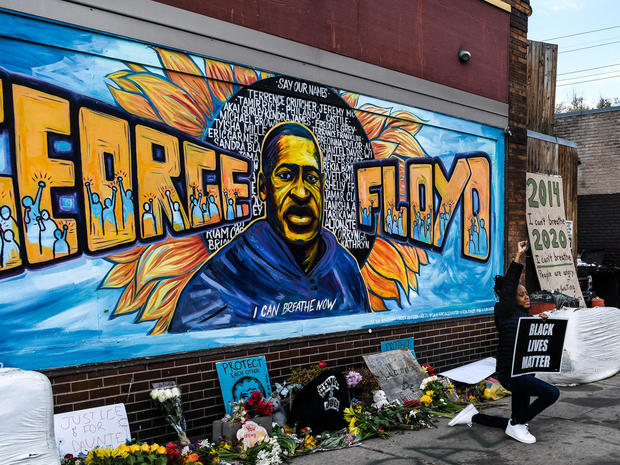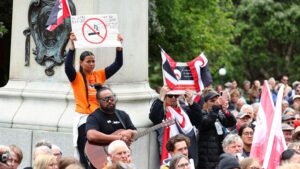Minnesota’s Department of Human Rights said Wednesday that a nearly 2-year investigation has revealed that there’s probable cause that the city of Minneapolis and the Minneapolis Police Department is engaging in a pattern or practice of race discrimination in violation of the state’s Human Rights Act.
The investigation, announced after the murder of George Floyd in May 2020, examined whether the city and the police department were using racially discriminatory practices and policies.
“Following the murder of George Floyd, demands to end discriminatory policing practices reverberated across the world,” Minnesota Department of Human Rights Commissioner Rebecca Lucero said when announcing the report’s findings. “Those demands remain just as urgent today with the announcement of the investigative findings which paints an unsettling picture of the City of Minneapolis and the Minneapolis Police Department engaging in a pattern of racial discrimination over the last decade.”
In a 72-page report, the human rights department said the MPD “engages in a pattern or practice of discriminatory, race-based policing,” citing “racial disparities in how MPD officers use force, stop, search, arrest, and cite people of color;” “officers’ use of covert social media to surveil Black individuals and Black organizations, unrelated to criminal activity;” and “MPD officers’ consistent use of racist, misogynistic, and disrespectful language.”

As an example, the report notes that “MPD’s data shows that during the time neck restraints were permitted under MPD policy, MPD officers were almost twice as likely to use neck restraints against Black individuals than white individuals who MPD officers recorded as behaving in the same way when interacting with police and whose police interaction stemmed from the same alleged offense or event.”
The report also alleges that these problems are caused primarily by the department’s organizational culture, citing “deficient” training that “emphasizes a paramilitary approach to policing that results in officers unnecessarily escalating encounters or using inappropriate levels of force.”
One expert review of the MPD’s use of force files found that MPD officers used “unnecessary and inappropriate levels of force in 52.6% of incidents in which they used a neck restraint, and in 37.1% of incidents in which they sprayed chemical irritants against individuals of all racial and ethnic backgrounds,” the report said.
The report also called the department’s accountability procedures, “inefficient and ineffective,” and said the department has not done enough to address racial disparities.
“Without fundamental organizational culture changes, reforming MPD’s policies, procedures, and trainings will be meaningless,” the report said.
The city’s mayor, Jacob Frey, said he’s “outraged” by the report’s findings, and said the report would help the city continue to improve its policing policies.
“This report reinforces our need to double-down even further to shift the culture in our police department, to hold up and hire community-oriented officers, and hold those accountable who fall short of our Minneapolis values,” he said in a statement.
Interim Chief Amelia Huffman, who was tapped to run the department in December 2021 after the previous chief retired, said the department is “committed to promoting public trust and officer safety.”
“During the past two years, we have been moving forward with reforms to ensure we have an effective, constitutional police service that people in our community need and want,” Huffman said. “We will review this report to make sure we have a clear understanding of each issue raised. We are committed to promoting public trust and officer safety through ongoing investments in our people, training, policies, and processes.”
The investigation was first announced in June 2020, soon after Floyd was killed by Derek Chauvin, who at the time was an officer with the Minneapolis Police Department. Video showing Chauvin pressing his knee into Floyd’s neck for more than nine minutes sparked international outrage and a reckoning on race in the U.S.
Chauvin was found guilty almost a year later of unintentional second-degree murder, third-degree murder and second-degree manslaughter, and was sentenced to 22 and 1/2 years in prison last June.

When announcing the Department of Human Rights’ investigation, Minnesota governor Tim Walz said it would not only examine Floyd’s death, but would also encompass the last 10 years of the city’s policing “to determine if the department has utilized systemic discriminatory practices towards people of color.”
“We’re not going to restore peace on our streets by having a bigger group of National Guard show up. We’re not going to establish peace on our streets by keeping a curfew in place all the time,” Walz said when announcing the probe. “We’re going to establish peace on our streets when we address the systemic issues that caused it in the first place.”
“If this is not an inflection point… this will come back again,” he added.
Now that the findings have been released, the human rights department said the next step is to work with the city to implement a consent decree, a court-enforceable agreement that outlines changes that will be made.
“Race-based policing is unlawful and harms everyone, especially people of color and Indigenous community members – sometimes costing community members their lives,” Lucero said. “I look forward to the work ahead with the City, MPD, and community members to improve public safety by reversing unlawful policing practices.”




